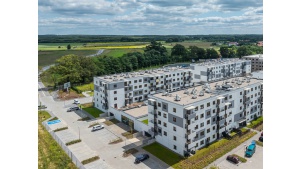The Future Role of Flex — expert analysis
Mindspace, a global provider of boutique, flexible workspaces, together with JLL, Colliers International, CBRE, ShareSpace and Brookfield Partners, has published an eBook with forecasts for the development of the flex office space sector in Poland. The experts agree that the current situation has prompted a number of companies to analyse their long-term lease obligations and redesign their strategies for further actions.
Flexible space — a certain solution for uncertain times
2020 was a difficult year for the whole commercial real estate industry, including the office sector and flex spaces. Due to the flexibility of contracts, providers of such spaces experienced a decrease in occupancy levels at the beginning of the coronavirus pandemic. Experts predict that as a result of the current crisis, subleases may increase in quantity throughout 2021. On the other hand, flex space providers, including Mindspace, have observed a growth in demand. Due to the uncertain, difficult times, many companies have started to treat flexible office space as an alternative to traditional offices. This solution has gained popularity among large corporations and smaller companies alike. The minimization of operating costs, the lack of long-term obligations, and the possibility to adapt the size of the office to the market situation have led numerous companies to move some of their branch offices or even their headquarters to flexible spaces.
More regional flexible areas
Alternatives to traditional office leases will be sought by companies from all over Poland — especially those with uncertain growth prospects. According to the experts, in the long run this will result in an increase in the offer of flexible office space not only in Warsaw, but also in smaller urban areas. Indeed, as a result of the pandemic, many companies are also considering leasing satellite offices on the outskirts of cities or in residential areas. This strategy aims to provide appropriate infrastructure for employees who prefer to work from home but, depending on their needs, will also be able to use the company’s offices.
Consolidation
The experts have observed that companies previously offering a completely different type of lease are now planning or have already started to introduce flexible solutions. Increasing the resources of flexible office space in Poland may result in many new transactions in this sector. The experts predict that among other trends, the coronavirus pandemic will lead to mergers and acquisitions, especially in mature office markets.
Dan Zakai, Co-Founder & CEO of Mindspace, said: “We expect a major consolidation in the sector, with a number of M&As taking place over the next 12–24 months. Well established workspace providers that cater to enterprise tenants, and generated profits and incurred high occupancy rates going into the crisis, are the most likely to survive and later lead.”
Partnership-based agreements
Another trend in the flexible office space market, whose growth was accelerated by the coronavirus pandemic, is a marked shift from traditional leases to more partnership-based agreements. According to Dan Zakai, this will allow landlords to welcome the benefits this approach brings, most notably creating additional revenue and achieving higher utilization of their assets, at lower risk and cost.
2022 — a time for stabilisation
The experts say the effects of the ongoing crisis will continue to be observed in the first half of the upcoming 2021. The demand for flex office space is expected to increase significantly in 2022, particularly among SMEs and large corporations.
These are just a few of the many predictions concerning the development of the flexible office space sector in Poland. The analysis, including detailed forecasts, is available to read here: https://hs.mindspace.me/tof/ebook/futureflex-pl
The eBook was created in cooperation with Adam Lis from JLL, Renata Hartle and Thomas Jodar from Colliers International, Konrad Szaruga from CBRE, Robert Chmielewski from ShareSpace, and Filip Sarzyński from Brookfield Partners.

Deweloperzy ukrywają ceny mieszkań. Z troski o klientów czy swoje portfele?

Więcej przestrzeni, mniej hałasu – dlaczego Polacy coraz częściej wybierają przedmieścia?

Jak czytać rzuty mieszkań i uniknąć przykrych niespodzianek? AI ułatwia wybór
Więcej ważnych informacji
 Jedynka Newserii
Jedynka Newserii

 Jedynka Newserii
Jedynka Newserii

Handel

Polskie MŚP otrzymają większe wsparcie w ekspansji międzynarodowej. To cel nowej inicjatywy sześciu instytucji
Firmy z sektora małych i średnich przedsiębiorstw otrzymają kompleksowe wsparcie na potrzeby zwiększania konkurencyjności na arenie międzynarodowej. Taki jest cel wspólnej inicjatywy instytucji zrzeszonych w Grupie PFR pod szyldem Team Poland. Obejmuje ona zarówno wsparcie kapitałowe, w postaci gwarancji, pożyczek czy ubezpieczenia, jak i doradztwo oraz wsparcie promocyjne i informacyjne, dzięki czemu mikro-, małym i średnim firmom łatwiej będzie podjąć decyzję o ekspansji zagranicznej. Pierwszy projekt dotyczy wsparcia dla firm zainteresowanych uczestnictwem w odbudowie Ukrainy.
Bankowość
RPP zgodna co do potrzeby obniżania stóp procentowych. Trwają dyskusje dotyczące tempa tych decyzji

W lipcu Rada Polityki Pieniężnej po raz drugi w tym roku obniżyła stopy procentowe, określając swój ruch mianem dostosowania. W kolejnych miesiącach można oczekiwać kolejnych obniżek, ale ich tempo i termin będą zależeć od efektów dotychczasowych decyzji i wzrostu płac. Docelowo główna stopa procentowa ma wynosić 3,5 proc. Te okoliczności sprzyjają kredytobiorcom.
Handel
Umowa z krajami Mercosur coraz bliżej. W. Buda: Polska nie wykorzystała swojej prezydencji do jej zablokowania

– Polska podczas prezydencji w Radzie UE nie wykorzystała szansy na obronę swoich interesów w sprawie umowy z krajami Mercosur – ocenia europoseł PiS Waldemar Buda. W jego ocenie polski rząd, mimo sprzeciwu wobec zapisów umowy, nie zbudował w UE sojuszy niezbędnych do jej odrzucenia. Porozumienie o wolnym handlu spotyka się przede wszystkim z protestami europejskich rolników, którzy obawiają się zalania wspólnego rynku tańszą żywnością z krajów Ameryki Południowej. Według europosła wszystko może się rozegrać w najbliższych tygodniach.
Partner serwisu
Szkolenia

Akademia Newserii
Akademia Newserii to projekt, w ramach którego najlepsi polscy dziennikarze biznesowi, giełdowi oraz lifestylowi, a także szkoleniowcy z wieloletnim doświadczeniem dzielą się swoją wiedzą nt. pracy z mediami.




![Część środków z Planu Społeczno-Klimatycznego trafi na walkę z ubóstwem transportowym. Organizacje branżowe apelują o zmianę priorytetowych projektów [DEPESZA]](https://www.newseria.pl/files/1097841585/rower3,w_85,_small.jpg)




.gif)

 |
| |
| |
|